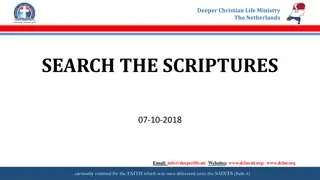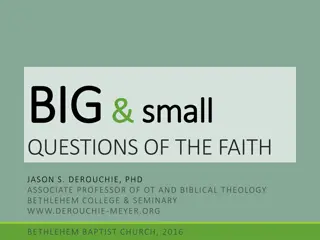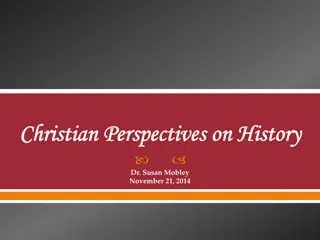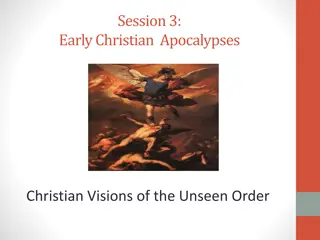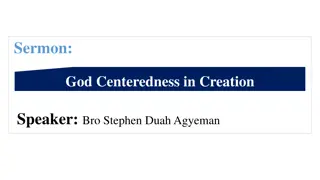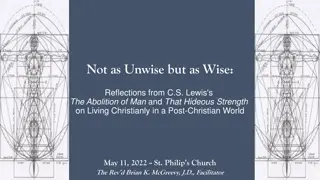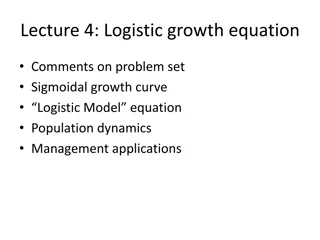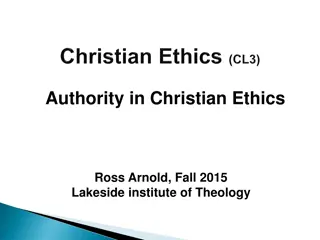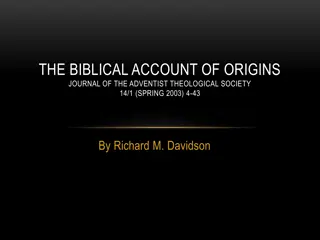Christian Perspectives on Economic Growth: Insights from Genesis and Beyond
Exploring the intersection of Christian beliefs and economic growth, this analysis delves into the biblical perspectives on creation, fall, and redemption in relation to the concept of economic progress. Drawing from key passages in Genesis and biblical teachings, it highlights the dynamic relationship between human stewardship, creativity, and the common grace of God in promoting sustainable growth. The discussion emphasizes the role of believers as agents of positive change in the economic sphere, aligning with the larger narrative of salvation and societal well-being.
Download Presentation

Please find below an Image/Link to download the presentation.
The content on the website is provided AS IS for your information and personal use only. It may not be sold, licensed, or shared on other websites without obtaining consent from the author.If you encounter any issues during the download, it is possible that the publisher has removed the file from their server.
You are allowed to download the files provided on this website for personal or commercial use, subject to the condition that they are used lawfully. All files are the property of their respective owners.
The content on the website is provided AS IS for your information and personal use only. It may not be sold, licensed, or shared on other websites without obtaining consent from the author.
E N D
Presentation Transcript
A Christian Perspective on Economic Growth- Moderately PRO Dr Esmond Birnie, Senior Economist at Ulster University Business School Friday 7 July 2023
Introduction Conclusion + broad approach Growth not the highest good but does seem to have been part of God s purposes and probably still is part of those purposes. Base the latter on what the Bible (Creation, Fall, Redemption, Last Things) seems to imply about economic growth. our beliefs about economic growth are almost religious (Raworth, 2022, Doughnut Economics, p. 243).
Biblical Creation & economic growth Genesis 1:26, 28 fruitful..multiply fill the earth subdue dominion Clear endorsement/command for growth of human population. Population growth leads to growth of L ( N ) and hence growth of Q ( Y ) in the aggregate production function. Less explicitly, still implied, a mandate for growth in Q/L as well.
Also, can go from creation to growth Via Imago Dei and hence creativity As long as successive generations steward resources creatively, invent new services that have value for others, or find new efficiencies in production that free resources for other good uses, there will be growth . Conclusion of E.S. Noell and S.L.S. Smith 2020, Economics, Theology and the Case for Economic Growth , Christian Scholars Review.
Biblical Fall & economic growth Sin is now here and so God s curse makes growth harder (Genesis 3:17-19) but not impossible. The Genesis 1:26, 28 cultural mandate is still there and has been partly achieved (even if often by non-believers, see the music and metals in Genesis 4). From Genesis 3:21 God has continued to show (material) kindness to the whole of humanity. There has been a common grace (Matt. 5:45 rain on all), part of that government/rule of law- a good thing (even if always flawed) in itself and also (North, Barro et al) a pre- condition for growth.
Biblical Redemption &Economic Growth 1st through OT Israel, now in the Church era Might think priority to evangelise/disciple (Matthew 28:18-20) leaves little space for GDP. But, alongside God s plan of salvation, common grace still operates and Christians are to be delivery agents, e.g. Jeremiah chapter 29 build houses plant crops grow your families seek the welfare of the city Even pre- 17thC. scientific revolution (itself owing a lot to Christianity) in the mid Middle Ages a mini industrial revolution including tech improvements in the monasteries, e.g. application of watermills. Francis Bacon relief of man s estate .
Biblical Last Things/Consummation & growth Growth NOT irrelevant in the New Heaven and New Earth: Even with fire of judgement, some continuity to this world: Rev. 21:24, 26 ( kainos , not neos ). Heaven not static but (likely) continuous and infinite growth in knowledge (primarily of God, but could be of other things too). We know (50s growth theory etc.) knowledge is the main driver of economic growth! Picture- Tate Gallery Diagrams- Encyclopedia Britainnica
Final thoughts Necessary realism Not claiming GDP a perfect measure (but quality of life measures have problems too, whose value judgements?) Recognise moral challenge to economic growth (people choose the wrong goods and services) but the moral challenge cuts both ways (B. Friedman) Certainly not saying growth should always be the highest priority and Bible some helpful moral restraints: (a.) Remember the LORD is the source of wealth, Deut. 8:18. (b.) One day in seven break from work (Gen.2:1-2 and Exodus 20:8-10)
Final, Final thoughts Cannot deny scale of the Carbon/other environmental challenge, e.g. getting to sufficient absolute de- coupling . Even if relatively pro-growth need to recognise prospects for such growth relatively limited, i.e. in the West not going back to the 1960s! Picture: World Economic Forum & McKinsey
Thank you Looking forward to discussion Dr Esmond Birnie 07703 184459 esmond.birnie@ulster.ac.uk


![❤[PDF]⚡ Escaping from Eden: Does Genesis Teach that the Human Race was Created](/thumb/21697/pdf-escaping-from-eden-does-genesis-teach-that-the-human-race-was-created.jpg)








